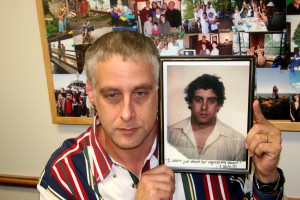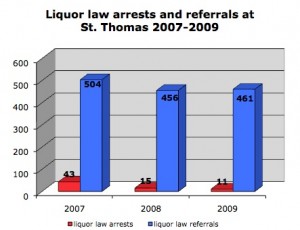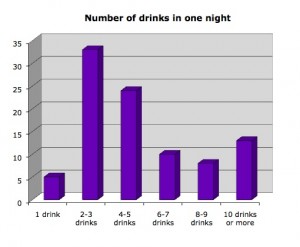Editor’s Note: Throughout the week, TommieMedia will be featuring stories on drinking and campus partying. Make sure to check out the Perspectives on Partying page for daily updates.
Assistant Dean of Students Jim Sachs said he used to be a “major-league partier” in his youth, and his past experiences have influenced how he deals with student drinking issues now.
In the corner of his office he has a photo of himself in his twenties, and he said it reminds him that he used to behave like many of the college students who come into his office. When he meets with students who have been cited for underage drinking on campus, he gives them advice.

“Be better, smarter, wiser, more courteous, more considerate than I was. … It doesn’t mean you can’t have fun,” Sachs said. “I know you’re going to do a lot of this stuff, and I’ll probably end up worrying, but if you’re going to do it, try to be better than I was.”
Sachs, who calls himself the “disciplinary guy,” said at least 80 percent of discipline issues on campus are alcohol related. In 2000, 85 to 90 percent of discipline cases were alcohol-related, according to The Aquin, so the percentage appears to have decreased slightly during the last decade. Sachs meets with students who have been cited for underage drinking, social host ordinance violations and other alcohol-related incidents.
Alcohol policy for students in on-campus housing
Cari Fealy, associate director of Residence Life, said the on-campus housing policy is that underage students cannot have alcohol, and students of age can. But there is also a responsibility clause, Fealy said.
“It is against policy for anyone, if they are over or under 21, to be intoxicated to the point of needing assistance, being sent off campus, things like that,” she said.
Residence Life trains apartment coordinators and resident advisers to educate residents on safe alcohol use, and meets with any student sent to detox.
Depending on the situation, ACs or RAs confront the issue on their own or request help from Public Safety and an AC or RA from a different building.
In a TommieMedia survey, 72.4 percent of 100 total respondents said St. Thomas should make on-campus drinking policies less strict.
Public Safety’s role in drinking enforcement

Public Safety has seen a decrease in liquor law arrests. In 2007, 45 liquor law arrests were reported, compared to 11 arrests in 2009. Liquor law referrals, however, increased slightly from 456 referrals in 2008 to 461 referrals last year.
Associate Director of Public Safety Michael Barrett defined alcohol referrals as anything that results in disciplinary action “on which a record is kept and which may result in the imposition of a sanction.”
Public Safety’s approach in dealing with intoxicated students has shifted from enforcement to medical evaluation over the past few years, Barrett said.
He said in the past, “we never felt comfortable just releasing a student.” Dangerously intoxicated students would be sent to Ramsey County detox, but Barrett said that can be scary.
“It’s not a four-star hotel,” he said. “You are there with career alcoholics.”
He said students are still sent to detox, but fewer students are sent than in the past. Public Safety officers now assess situations by asking questions about how much the student has had to drink, when the student last ate, and what general medical conditions the student has.

Barrett said when asked how many drinks they have, students will almost always answer two. The TommieMedia survey showed 36.3 percent of respondents said they have two to three drinks in one night.
Officers take a preliminary breathalyzer test to get a blood-alcohol content level. The officers then wait with the students for about 15 minutes before taking another reading.
Public Safety then calls someone to care for the intoxicated student. The Federal Education Right to Privacy Act allows for Public Safety to contact family members about a students’ condition. An officer waits and monitors the student’s health until a care provider arrives.
Barrett said Public Safety deals with about a dozen students in alcohol-related incidents each weekend. He added that because the officers devote so much time to students in these situations, officers have less time to police other areas of campus.
Repeated offenses may result in probation
Repeated alcohol offenses could result in students getting kicked out of housing or put on probation. Students on probation cannot apply for leadership positions or study abroad, Fealy said.
Typically, first-time offenders get a warning, and a $60 fee or an $80 fee if the student is a host of a gathering where alcohol is consumed illegally, Fealy said. They also must take an online alcohol education course.
Fees double for second time offenses and students could appear before a disciplinary board and be put on probation, Fealy said.
Fealy said offenses are noted on student records, which the school keeps for seven years. If a future employer or graduate school requests the student’s discipline history, the information can be released if the student gives consent. Sachs said the legal process for off-campus students is a little different. Offenses are handled by the dean’s office and students could face legal penalties with the city.
Residence Life and dean’s office discipline students
After Residence Life hall directors review student reports they meet with the student to decide whether there was a violation of the conduct policy. Until that meeting, all responsibility is alleged.
“You can’t assess it until you meet the student,” Sachs said. “When the student comes in, that’s the magic moment.”
What happens in the dean’s office is kept private under the protection of FERPA. But Sachs said these meetings have a standard protocol. First, he gets to know students before listening to their stories. He said he gives the students advice as if they were his children.
“It’s not hard for me to transfer the feelings that ‘If it were my kids, what would I want the person sitting in the chair to be doing?’ and it keeps my compass pretty straight and true,” he said.
Theresa Malloy can be reached at mall5754@stthomas.edu.


